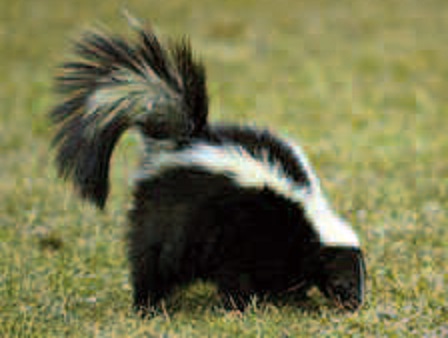SCORES & OUTDOORS: Spring is in the air; so is skunk odor
 by Roland D. Hallee
by Roland D. Hallee
There it is! That familiar odor in the wind that reminds you of a warm, summer night. It is unmistakable, and sometimes can be a sort of positive sign of spring. That odor was definitely in the air at our house this past weekend. Essence of skunk.
Striped skunks, Mephitis mephitis, had been classified to be in the same family with ferrets, weasels, otters and badgers. However, recent generic evidence suggests the skunks are not as closely related as first thought, and therefore are now classified in their own family.
Skunks are placid, retiring and non-aggressive. You can actually talk to a skunk, and it will avoid you. They try very hard not to get in harm’s way. I have had instances where I have spoken, softly, to skunks that have approached me, and “talked” them into taking another route. Although they have excellent senses of smell and hearing, they have poor vision. They cannot see with any clarity all objects more than 10 feet away, which also makes them vulnerable to death by road traffic.
Actually, one summer, we had a family of five skunks living under our deck at camp, and, believe it or not, we didn’t even know they were there until one morning, around 5 a.m., just as the sun was beginning to rise, I saw one adult crawl under the deck, followed by the three kits, and then the second adult. Other than that, no odor, nor any other sign of their presence.
Skunks are omnivorous, eating both plants and animal material, and changing their diet as the seasons change. They eat insects and larvae, earthworms, small rodents, lizards, salamanders, frogs, snakes, birds, moles and eggs. They also commonly eat berries, roots, leaves, grasses, fungi and nuts.
In settled areas, skunks also seek human garbage. Less often, skunks may be found acting as scavengers, eating birds and rodent carcasses left by cats. Skunks will even find their way into garages and cellars where pet foods are stored.
Skunks are one of the primary predators of the honeybee, relying on their thick fur to protect them from stings. The skunk scratches at the front of the beehive and eats the guard bees that come out to investigate. Mother skunks are known to teach this method to their young.
Skunks are not true hibernators in the winter, but do den up for extended periods of time. That is why, this time of year, you will see, or smell, the occasional appearance of skunks. They come out to forage while the temperatures are warmer. However, they remain generally inactive and feed rarely, going through a dormant stage. They often overwinter in a huddle of multiple females, up to as many as 12, while males often den alone. The same winter den is often used repeatedly.
When born, skunk kits are blind, deaf, and covered in a soft layer of fur. About three weeks after birth, their eyes open. The kits are weaned about two months after birth, but generally stay with their mother until they are ready to mate, about one year of age.
The mother is very protective of her kits and will often spray at the first sign of danger. The male plays no part in raising the young and may even kill them.
Most predatory animals of the Americas, such as wolves, foxes and badgers, seldom attack skunks, presumably out of fear of being sprayed. The exception is the great horned-owl, the skunk’s only serious predator, which, like most birds, has a poor to nonexistent sense of smell.
The skunk, still, gets no respect. The word skunk is a corruption of an Abenaki name for them, segongw or segonku, which means “one who squirts,” in the Algonquian language. Even in slang French, mostly Canadian-French, the term for skunk relates to its odiferous characteristic, known as “une bete puante” (animal that stinks). The real French word for skunk is “moufette”.
It is commonly known that skunks make excellent pets. However, make sure of one thing before you proceed. Is the keeping of a pet skunk legal in your state? As for Maine, it has been illegal to keep a skunk since 2002. Only if you acquire a Class B or C license from the USDA can you keep a skunk in Maine, and must be for educational purposes only. Keeping of skunks is legal in only eight states, Florida, Indiana, Iowa, Ohio, Oklahoma, South Dakota, Wisconsin and Wyoming.
Long an enemy of most humans, when all is taken into consideration, skunks aren’t really all that bad.
Roland’s trivia question of the week:
Who holds the American League record for most home runs in a season?
Responsible journalism is hard work!
It is also expensive!
If you enjoy reading The Town Line and the good news we bring you each week, would you consider a donation to help us continue the work we’re doing?
The Town Line is a 501(c)(3) nonprofit private foundation, and all donations are tax deductible under the Internal Revenue Service code.
To help, please visit our online donation page or mail a check payable to The Town Line, PO Box 89, South China, ME 04358. Your contribution is appreciated!



Leave a Reply
Want to join the discussion?Feel free to contribute!